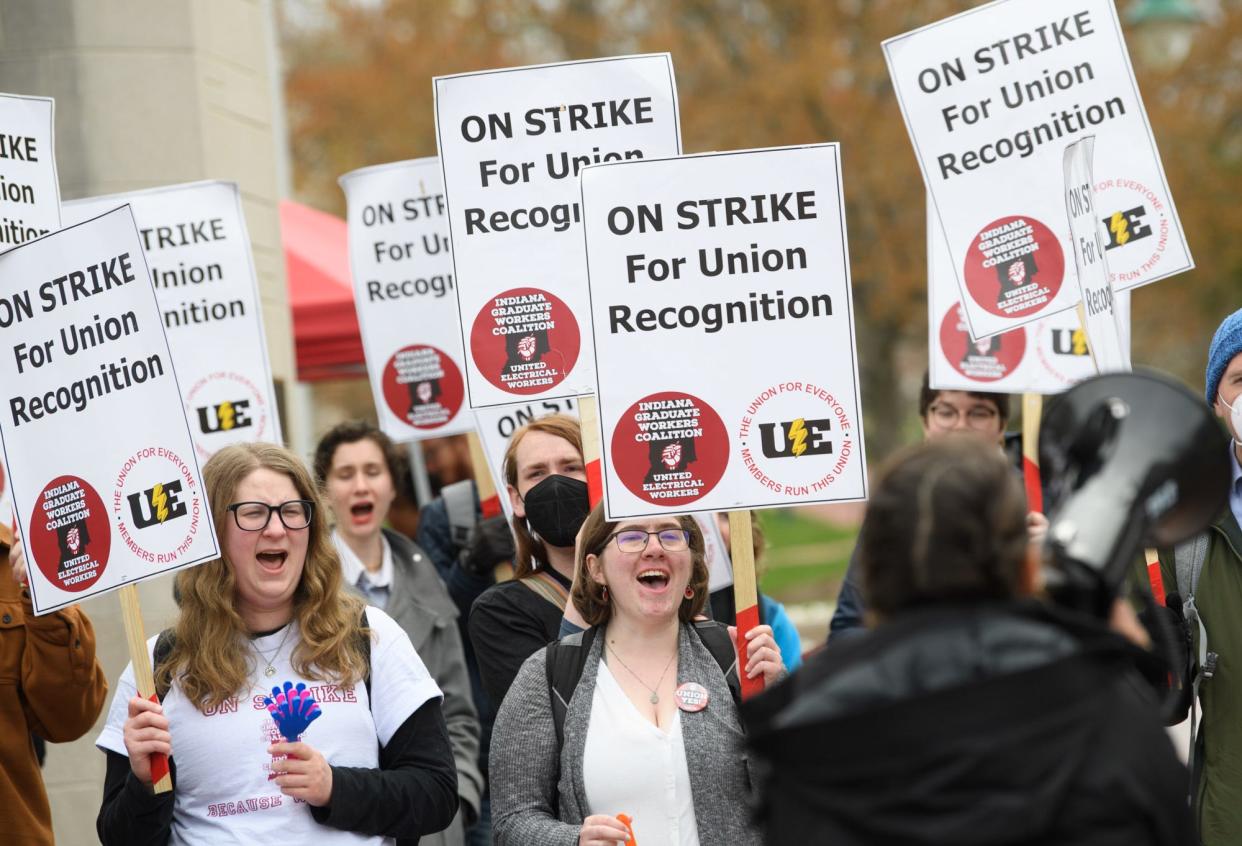UPDATE: Graduate workers coalition votes to strike, asks for living wage, path for union
Editor's note: This story has been updated.
On Monday, April 15, members of the Indiana Graduate Workers Coalition voted to authorize the strike. A total of 646 members voted in favor of the strike (92%) while 53 voted against. IGWC members will now strike from April 17-19 and abstain from instructional and administrative duties.
_______________________________________________________
Members of the Indiana Graduate Workers Coalition have endorsed a call for a three-day strike against Indiana University from April 17-19. If union members vote to proceed with the strike, it will be the IGWC’s first strike against IU since the 2022 spring semester.
The IGWC endorsed the three-day strike during a general membership meeting on April 14, with about 100 members in attendance. The vote on whether to strike will now be voted on by the 1,300-member organization at large, who will cast their votes electronically before 6 p.m. on April 15.
David Garner, communication chair for the IGWC, said the proposed strike continues the IGWC’s efforts this semester to once again push for union recognition and raise graduate worker salaries to a “living wage,” as defined by the MIT Living Wage Calculator.

In January, IGWC members delivered over 1,000 unionization cards and a letter to IU President Pamela Whitten, asking IU once again to recognize the union and to give graduate workers a “living wage.”
“And they never responded to that,” Garner said. “So since they don’t seem to respond to anything but a strike, we decided to have a striking conversation.”
Faculty plan to vote on 'no-confidence' motion
If authorized, the strike would come just one day after members of the Bloomington faculty plan to vote on a no-confidence motion against President Whitten, Provost Rahul Shrivastav and Carrie Docherty, vice provost for faculty and academic affairs. The motion, which was introduced by Bloomington Faculty Council President Colin Johnson, accused Whitten’s administration of violating principles of shared governance and cited IU’s ongoing refusal to recognize the union as an example.
Ben Robinson, an associate professor of Germanic studies at IU, said the vote of no confidence and proposed strike show a general discontent with the Whitten administration and their handling of shared governance within IU.
“I think the union is closely tied to what the faculty is discontent about,” Robinson said. “We’re not being fully appreciated as central stakeholders. Somehow, this administration is more concerned with actors outside of the university.”
The proposed strike would also begin on “IU Day,” Indiana University’s annual fundraising marathon. On April 17, IU hopes to raise $1 million in support of scholarships and general funds.
Garner notes that April 17 is also a “National Day of Action for Higher Education,” when unions and organizations across the country will participate in demonstrations in support of higher education labor unions.
Strike in 2022 lasted four weeks
In 2022, IGWC members went on strike for four weeks during the spring semester, abstaining from instructional and administrative work like proctoring exams, grading and advising. The strike led to major victories for graduate workers, including the elimination of mandatory fees and stipend increases that made IU more competitive with other Big Ten universities.
Yet IU stopped short of recognizing the union and credited the changes to a Provost-convened graduate student task force, rather than addressing the IGWC by name.
Garner says the 2022 wage increases have not kept pace with the rising rate of inflation, noting that graduate workers’ 10-month stipends are now $10,000 below the “living wage” prescribed by the MIT Living Wage Calculator for the cost of living in Bloomington.
IU argues that the MIT Living Wage calculation is inaccurate, since graduate workers are part-time and IU offers health insurance and other benefits to its workers. But Garner argues that graduate workers do work full-time, between working hours, classes and research.
“We are asked to be full-time researchers, students and teachers, and there’s no extra time for us to have another part-time job with all of that,” Garner said. “To designate us as part-time workers is frankly out of touch.”In 2021, the IGWC presented 1,584 union cards (out of approximately 2,500 graduate workers) to the IU Board of Trustees and asked for an election. In the private sector, once 30% of employees sign a petition or union cards in favor of a union election, the National Labor Relations Board (NLRB) will step in to conduct an election and ensure fair bargaining.
But because IU is in the public sector, no such external enforcement mechanism exists.
Robinson said many mistakenly believe that since IU is a public university, unions can’t be formed. He notes that many unions exist on campus, including the local Communications Workers of America chapter (CWA Local 4730) and the International Alliance of Theatrical Stage Employees chapter (IASTE Local 618).
“There’s no logistical barrier to it at all,” Robinson said. “It’s a matter of their will, and if they change their will to reflect the clearly stated interest of the graduate workers, they could begin an immediate process towards unionization."
Reach Brian Rosenzweig at brian@heraldt.com.
This article originally appeared on The Herald-Times: Indiana University graduate workers coalition votes for 3-day strike
